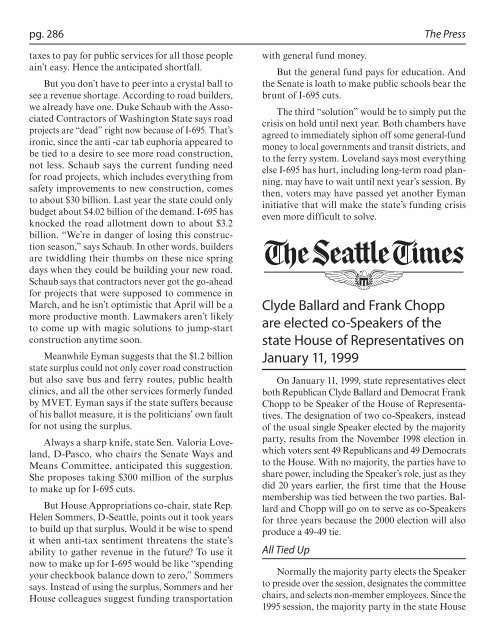Helen Sommers: An Oral History
Helen Sommers: An Oral History
Helen Sommers: An Oral History
You also want an ePaper? Increase the reach of your titles
YUMPU automatically turns print PDFs into web optimized ePapers that Google loves.
pg. 286 The Press<br />
taxes to pay for public services for all those people<br />
ain’t easy. Hence the anticipated shortfall.<br />
But you don’t have to peer into a crystal ball to<br />
see a revenue shortage. According to road builders,<br />
we already have one. Duke Schaub with the Associated<br />
Contractors of Washington State says road<br />
projects are “dead” right now because of I-695. That’s<br />
ironic, since the anti -car tab euphoria appeared to<br />
be tied to a desire to see more road construction,<br />
not less. Schaub says the current funding need<br />
for road projects, which includes everything from<br />
safety improvements to new construction, comes<br />
to about $30 billion. Last year the state could only<br />
budget about $4.02 billion of the demand. I-695 has<br />
knocked the road allotment down to about $3.2<br />
billion. “We’re in danger of losing this construction<br />
season,” says Schaub. In other words, builders<br />
are twiddling their thumbs on these nice spring<br />
days when they could be building your new road.<br />
Schaub says that contractors never got the go-ahead<br />
for projects that were supposed to commence in<br />
March, and he isn’t optimistic that April will be a<br />
more productive month. Lawmakers aren’t likely<br />
to come up with magic solutions to jump-start<br />
construction anytime soon.<br />
Meanwhile Eyman suggests that the $1.2 billion<br />
state surplus could not only cover road construction<br />
but also save bus and ferry routes, public health<br />
clinics, and all the other services formerly funded<br />
by MVET. Eyman says if the state suffers because<br />
of his ballot measure, it is the politicians’ own fault<br />
for not using the surplus.<br />
Always a sharp knife, state Sen. Valoria Loveland,<br />
D-Pasco, who chairs the Senate Ways and<br />
Means Committee, anticipated this suggestion.<br />
She proposes taking $300 million of the surplus<br />
to make up for I-695 cuts.<br />
But House Appropriations co-chair, state Rep.<br />
<strong>Helen</strong> <strong>Sommers</strong>, D-Seattle, points out it took years<br />
to build up that surplus. Would it be wise to spend<br />
it when anti-tax sentiment threatens the state’s<br />
ability to gather revenue in the future? To use it<br />
now to make up for I-695 would be like “spending<br />
your checkbook balance down to zero,” <strong>Sommers</strong><br />
says. Instead of using the surplus, <strong>Sommers</strong> and her<br />
House colleagues suggest funding transportation<br />
with general fund money.<br />
But the general fund pays for education. <strong>An</strong>d<br />
the Senate is loath to make public schools bear the<br />
brunt of I-695 cuts.<br />
The third “solution” would be to simply put the<br />
crisis on hold until next year. Both chambers have<br />
agreed to immediately siphon off some general-fund<br />
money to local governments and transit districts, and<br />
to the ferry system. Loveland says most everything<br />
else I-695 has hurt, including long-term road planning,<br />
may have to wait until next year’s session. By<br />
then, voters may have passed yet another Eyman<br />
initiative that will make the state’s funding crisis<br />
even more difficult to solve.<br />
Clyde Ballard and Frank Chopp<br />
are elected co-Speakers of the<br />
state House of Representatives on<br />
January 11, 1999<br />
On January 11, 1999, state representatives elect<br />
both Republican Clyde Ballard and Democrat Frank<br />
Chopp to be Speaker of the House of Representatives.<br />
The designation of two co-Speakers, instead<br />
of the usual single Speaker elected by the majority<br />
party, results from the November 1998 election in<br />
which voters sent 49 Republicans and 49 Democrats<br />
to the House. With no majority, the parties have to<br />
share power, including the Speaker’s role, just as they<br />
did 20 years earlier, the first time that the House<br />
membership was tied between the two parties. Ballard<br />
and Chopp will go on to serve as co-Speakers<br />
for three years because the 2000 election will also<br />
produce a 49-49 tie.<br />
All Tied Up<br />
Normally the majority party elects the Speaker<br />
to preside over the session, designates the committee<br />
chairs, and selects non-member employees. Since the<br />
1995 session, the majority party in the state House
















